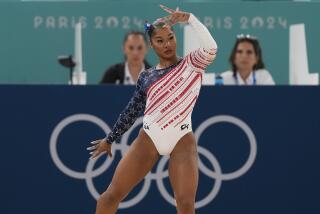Gymnastics Unit to Move on Cheating
- Share via
The admission by a former coach that the United States and Romania conspired to fix women’s gymnastics scores at last year’s World Championships in Rotterdam, the Netherlands, has brought some action from the United States Gymnastics Federation.
Mike Jacki, executive director of the USGF, said Tuesday he has sent a letter to the FIG (International Gymnastics Federation) executive committee that states he will address the issue at the next FIG meeting, which begins May 23 in Bienne, Switzerland. He also sent a letter to his judges reiterating the USGF would not tolerate any corruption in scoring.
Finally, Jacki said he has asked and received an analysis of the scores given by the U.S. judges in Rotterdam. He said both U.S. judges were the only judges at the World Championships to have their scores within .025 of the final score received by the athlete on every event they judged.
Officials of the FIG said Tuesday they have yet to receive the communication from Jacki. Vice President Frank Edmonds said from England that he assumed Jacki would report the allegation, but said there has been no precedent in dealing with it. Edmonds said the USGF has the option of dealing with the matter itself.
Secretary general Max Bangerter said from Switzerland that he hasn’t heard from Jacki but would see him at the next FIG meeting.
Greg Marsden, who resigned in January as U.S. national women’s gymnastics coach, said last week that he and U.S. officials participated in an attempt to fix scores.
Marsden was trying to illustrate the highly political nature of gymnastics when he told The Times he and a Romanian coach exchanged scores that were to be delivered to the countries’ respective judges. The scores were what each country wanted its athletes to receive.
The deal fell through when the Romanians performed well enough to get the scores on their own, and the U.S. athletes performed too poorly for the Romanian judge to comply without bringing undue attention to the scores.
Marsden also said the USGF has become a bureaucratic nightmare and that it is hindering the performance and results of its athletes.
“The people running the show are not program people--one is a judge, Jackie Fie (USGF women’s international technical coordinator), and the other two are businessmen--Mike Jacki and Mike Donahue (president of the USGF),” Marsden said. “They are not coaches, and they are trying to tell the coaches how to run the program and coach the athletes. These are the people who play the politics behind the scenes.
“I don’t think these people are intentionally trying to disadvantage the athletes, I just think they don’t know what needs to be done. I think that Jacki and Donahue need to stay in the business part of it, and when it comes to program, rely on the people who prepare the athletes. In fact, they have told me that they think the coaches are all jerks. My impression was that they merely tolerated us.
“The personal coaches are frustrated, and I had hoped my resigning would inspire them to stand up to those people. But their concern is if they stand up it will hurt their athletes, and their athletes won’t be chosen for things.
“These people are not . . . giving us the results we want, yet somehow they are never held accountable for those results.”
Jacki says neither he nor anyone at the USGF tells the coaches how to run their program. Interestingly, Jacki does plan to eliminate the committee that controls the women’s program decisions, and actually hire the personal coaches of the top seven athletes to make the decisions. He said this move was not precipitated by Marsden’s objections.
This move would eliminate the committee that Marsden claimed is the most meddlesome but would still leave 4 committees for the women’s program and 24 committees that oversee the operation of the USGF.
Jacki also says that no one should expect significant results until “all of a sudden somebody gives us a huge amount of money and allows me to hire coaches and require accountability.”
The U.S. women gymnasts had never won a medal in Olympic team competition before 1984, when they placed second to Romania, the only Eastern Bloc country to compete.
Jacki explains the money dilemma.
“That’s (money) the real reason we’re not better. Unlike the Soviet Union, we can’t hire coaches to work just for the USGF, we have to rely on the personal coaches, who have to worry about running a business besides coaching the elite athletes.”
Don Peters, the current U.S. women’s national team coach, agrees, saying there isn’t enough money to start with, and that not enough money gets to the athletes.
Peters, who also runs Southern California Acro Team (SCATS) gymnastics school in Huntington Beach, and coaches elite gymnasts, said more money would enable a better coach-to-athlete ratio, and lessen the coach burn-out problem.
But Marsden claims the USGF is an administrative fiasco, with or without the money.
“Jacki has done a tremendous job since he took over--he has taken the USGF from $300,000 in the red to $7 million in income last year,” Marsden said.
“But, what they do with the money is debatable. First of all, the more money they raise, the more they spend to raise more money. As a result, the athletes are forced to compete in too many fund-raising exhibitions, and they are worn out by the time they get to a competition that counts.
“I’m not saying they do anything corrupt with the money, but they don’t seem to use the money to address areas that would make a significant difference--like getting it to the athletes and to the coaches, to help curb training expenses.”
Jacki has seemingly taken some steps to correct that and on Tuesday announced plans to implement an athlete support program in 1989 that would get cash directly to the athlete so they “can train and not have to worry about where their next meal will come from.”
Jacki also defends the USGF’s use of its money.
“I (the USGF) did take in $7 million last year, but it costs me 80 to 90 cents for every $1 I make,” Jacki said. “Anybody who wants a copy of how we spend the money can just write in and call us and we will send it to them.”
Jacki said the 1987 audit of the USGF funds will be available next week.
Peters defends the USGF’s use of exhibitions to raise money and acknowledges the inherent pressures.
“You are not forced to go, but they (USGF) do get a little mad,” Peters said. “I kept Sabrina (Mar, a top-ranked gymnast) out of this year’s America Cup, and Jacki wrote a press release that took a shot at me. His job is to raise money and my job is to train the athlete, but there is a subtle pressure to send them.”
Marsden said Peters was upset that Marsden revealed the score-fixing plan in Rotterdam. He said Peters accused him of putting gymnastics on a par with professional wrestling.
“I will no longer hide the problems in the gymnastics system,” Marsden said. “I told him (Peters) if more people spoke up and exposed the political games played in the USGF, as well as on the international level, we would have a better program to offer our athletes. It’s the athletes who are being hurt by all these games.”
Peters declined to comment on his conversation with Marsden.
The men’s gymnastics program is not faced with these same problems and, for the most part, has escaped controversy. One reason, says Jacki, is that the women’s program is more than 10 times larger than the men’s. There are 138,000 members of the women’s group, whereas the men have only 22,000. Jacki also said the men’s program includes more college-age athletes, rather than 15-year-old girls.
Marsden’s appointment as national team coach was made to try to help curb the personal coach politics and unify the sport. Marsden, a successful women’s gymnastics coach at the University of Utah, does not coach elite athletes and was considered neutral. Jacki also tried to give Marsden unprecedented autonomy over the program. But, for whatever reason, it didn’t work.
Peters said he still believes Marsden is right for the job, but the timing was off.
“We should have brought him in after the 1988 Olympics rather than throwing him in six months before the World Championships,” Peters said.
Still, the gyms are filled with little girls dressed in ribbon-tied ponytails with wide-eyed dreams who practice six hours a day, seven days a week. That hasn’t changed.
Peters offers another opinion. “Our athletes aren’t letting us down, we are letting them down.”
More to Read
Go beyond the scoreboard
Get the latest on L.A.'s teams in the daily Sports Report newsletter.
You may occasionally receive promotional content from the Los Angeles Times.






